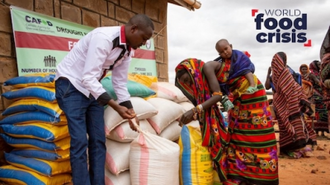CAFOD launches World Food Crisis Appeal as millions face severe hunger

Millions of people are facing a food crisis that could be worse than any we've lived through. All around the world families are finding it harder than ever to put food on the table. In Kenya, Ethiopia and South Sudan, up to 20 million people are fighting for their very survival.
The Catholic aid agency, CAFOD, has responded by launching a World Food Crisis Appeal - which aims to raise urgent funds to support those facing acute hunger, help people rebuild their lives, and encourage people to take action that can help build a better, fairer food system that works for everyone.
In East Africa, many of the people worst affected have been learning to cope with the impact of climate change for years - but collapsing supply chains, on top of four consecutive years of unbearable drought, have put everything they've worked for at risk.
CAFOD is responding to the World Food Crisis in countries across Africa, Asia, Latin America and the Middle East.
Christine Allen, CAFOD's Executive Director, has just returned from seeing the impact of the food crisis in northern Kenya. She said: "Even before the war in Ukraine started, the food system was in crisis and the impact of climate change was making it harder for those who grow most of the world's produce to put food on their own plates. The effects of the Russian invasion of Ukraine are trickling down the already stressed food system, and the poorest are feeling it most acutely.
"In some of the places I visited in northern Kenya, it has only rained a matter of minutes in the last two years. Climate change has devastated the region. The majority of people I met had already lost their precious livestock to the drought. The women in Tulidimtu village mourned their camel's death like they would a friend's. Livestock are like a savings account and in a drought, the death of livestock is often followed by the death of people.
"This crisis was not inevitable and is a result of human action. Firstly, the UK Government and international donors must address the funding gap in East Africa: UK aid to the region has almost halved in the past year due to budget cuts. The root causes of the crisis must also be addressed, including tackling climate change, fixing our broken food system, and providing more funding to community level responses."
The world food crisis is affecting people all around the world - but as with all crises, the most vulnerable are hit hardest. In a remote, mountainous village in Afghanistan, CAFOD is supporting families with cash so that they are able to buy food from the local market. One father told us:
"We did not have enough food for days. We had only bread for two mealtimes. For another mealtime, my children would eat grasses. My wife and my boy are hospitalised for eating grasses. Doctors said that their stomachs have problems and their intestines are damaged."
For more information and to donate to CAFOD's World Food Crisis Appeal see: www.cafod.org.uk/foodcrisis


















